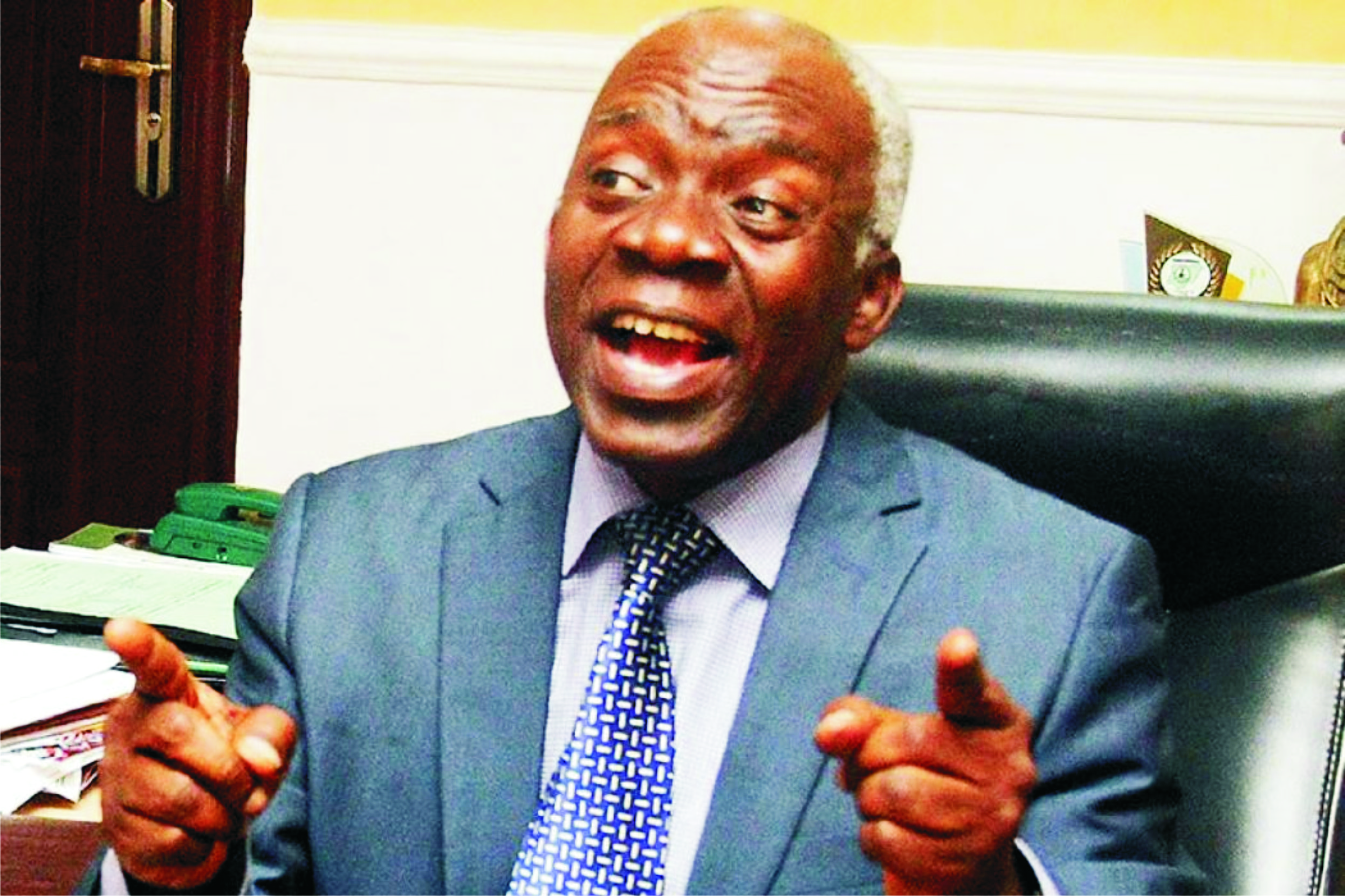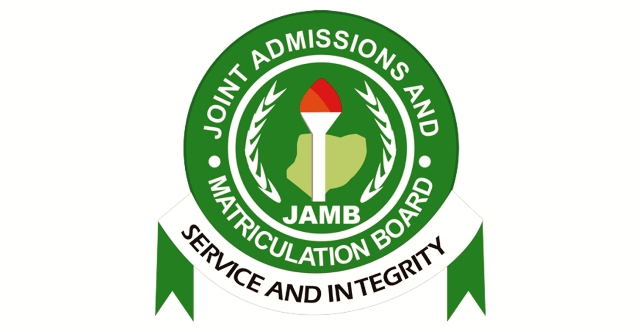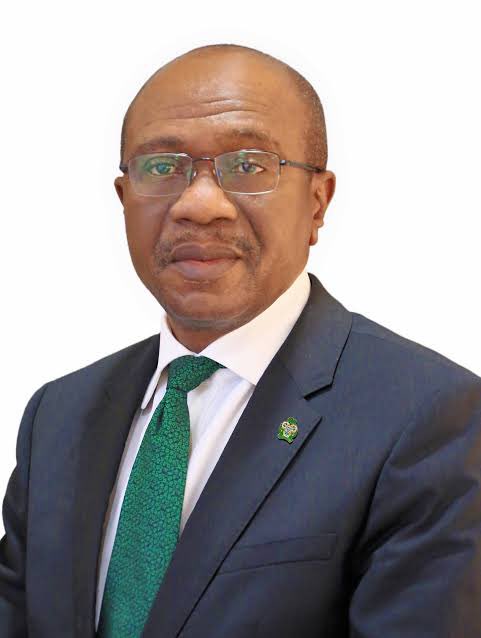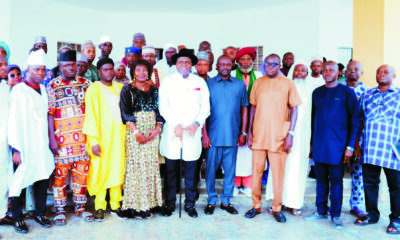News
Senate Accelerates Minimum Wage Bill Passage …Okays 1st, 2nd Readings Same Day …Says FG Approves Only N27,000 In Bill
Nigerian Senate yesterday suspended its standing rule 79 and set aside all legislative communication protocols to accelerate legislative actions on the controversial N27,000 Minimum Wage Bill, hence, the bill scaled through first and second reading st a single sitting .
This upper legislative chamber also set up an eight-man ad hoc committee representing the six geo-political zones to fine-tune the final passage of the Bill into law for the assent of President Muhammadu Buhari.
The members of the Senate ad hoc committee on Minimum Wage are Olushola Adayeye, who is the Chairman, Abu Ibrahim, who is the chairman of the Senate Committee on Labour, Binta Marsi, representing North East, Shehu Sani, North West, Francis Alimekina, South South, Sam Egwu, South East, Solomon Adokwe, North Central, and Solomon Adeola, South West.
Following a very thorough debate on the bill by the law makers , the Deputy Senate President, Ike Ekweremadu, who presided over the plenary, clarified that contrary to the media reports, there is only a single Bill from the executive to the Senate which he said has a recommendation of N27,000 for both federal and state workers.
Recall that the Minister of Labour and Employment, Chris Ngige, was reported to have said that in the recommendation of the Council of State, the federal government will pay its workers N30,000 while the state governments will pay their workers N27,000 as minimum wage.
To this end, he also said the recommendation in the Bill that the new national minimum wage be applied to all companies with up to twenty five workers may not be necessary because many low income workers may not be captured, pointing out that national minimum wage is for everybody.
Members of the House of Representatives, yesterday, faulted the Council of State for approving N27,000 as the new minimum wage when the agreement reached by the government, organised labour and the private sector was N30,000.
The lawmakers, therefore, expressed their readiness to adopt the amount proposed by the tripartite committee, whose report was presented to President Muhammadu Buhari.
At the plenary, yesterday, the Speaker, Yakubu Dogara, read a letter by Buhari to the legislature, seeking an amendment to the Minimum Wage Act 1981, to reflect a new minimum wage of N27,000.
The President said the amount was proposed by the tripartite committee and ratified by the Council of State.
The letter read, “The purpose of this letter is to forward to you for legislative action a new Minimum Wage BiII to further amend the National Minimum Wage (Amendment) Act, 2011).
“In order to give a new National Minimum Wage of N27,000 per month to the lowest paid Nigerian worker from the current N18,000 per month. Thus, new bill and the amendments contained therein were arrived at after consultations by the Tripartite Committee on National Minimum Wage, which was constituted by me in November 2017 to consider, make recommendations, and advise the government on this issue.
“The Tripartite Committee comprised representatives of the Federal Government, (Nigerian) Governor’s Forum, Organised Private Sector and the Organised Federations of Trade Unions in Nigeria.
“The Federal Executive Council, National Economic Council, and the National Council of State have all noted and approved these recommended amendments.”
Buhari added, “Other highlights of the amendments include: (i) Exemptions for establishments employing less than 25 persons, (ii) five years review period of the Act in consonance with the Constitutional Review for Pensions, (iii) alterations in the amount of fines payable by defaulters on the prosecution.
“Bearing in mind that issue of prescribing a National Minimum Wage for the Federation or any part thereof is within the Exclusive Legislative List of the 1999 Constitution of the Federal Republic of Nigeria (as amended), and listed as item No. 34 of Part 1 of the Second Schedule, it is my pleasure to forward this Bill for expeditious action.”
After reading the letter, Dogara pointed out that the N30,000, which was proposed by the tripartite committee, and which Federal Government said it would pay its workers in the lower cadre, was not reflected in the letter.
Ekwerremmadu noted that there must be conscious efforts to bridge the gap between the rich and the poor in the country, calling on the governors to improve their revenues by expanding all collectible taxes to finance the new minimum wage.
Earlier leading debate on the Bill, the Senate Leader, Ahmad Lawan pointed out that the Bill is an executive communication, which Rule 79 of the Senate Order Book requires must pass through three readings, different days before being passed for executive assent.
However, he said “This is a very critical bill and I therefore, feel that the Senate should give it a very expeditious passage; and that requires suspension of Order 79, so that we take the first and second reading immediately and refer it to the relevant committee.
His words “This is one bill that enjoys the support of every political party in Nigeria. The public and civil servants require motivation; they need incentives, they need to be cared for. It is my desire and I am sure it is the position of all the senators that this bill be given expeditious passage so that it takes effect immediately in 2019.
“We will work on the Appropriation Bill 2019. We have to reflect the financial implication of this bill. Moving from the current N18,000 minimum wage is certainly a major increase; it may not be what our civil servants hoped for and wanted, but it is still an improved situation”,.
Meanwhile, in their respective contributions, most of the senators canvassed that Senate increase the Minimum wage from N27,000 as recommended by the executive to N30,000, saying that Nigerian workers deserve more, which they all agreed that the nation can offer if the waste in governance will be reduced.
Senator Barau Jibril in his contribution said , the economy of the country is such that there is no doubt that the N18,000 is no longer acceptable for minimum wage. He said governors have to look inwards to generate more revenue to be able to pay the new minimum wage, likewise the private sector.
Emmanuel Paulker, in his remarks, observed that Nigerian workers now live in financial stress to meet their daily needs, punting out that there are still backlog of salaries owed by some state governors. He warned that the senate will not take a situation where when the Bill is passed, some governors will not pay, as that will make a mess of the whole efforts.
Senator Anyanwu Samuel, i pointed out that the wage Bill is still not yet enough compared to other economies, noting that it is not something to celebrate. According to him, though the Council of State has recommended N27,000, the senate can make it better by jerking it to N30,000 so that the labour union does not go on strike again.
Senator Shehu Sani also canvassed that the senate increase the minimum wage to N30,000, just as senator Solomon Adokwe, in his argument said the salary increase should not be fifty per cent across board as being championed in some quarters.
He said this will overbloat the wage Bill of the state governments, but explained that if extra nine thousand extra is added to the salary of every worker as the increase in minimum wage, then, the financial burden will be such that government can bear.
Senator Barnabas Gemade, also said that Nigeria can do better as the nation is not as poor as being made to look, but due to mismanagement of resources by those incharge.
He said governors are facing billions of naira charges by the Economic and Financial Crimes Commission (EFCC), yet they still claim they don’t have money to pay their workers, warning that government should do more to ensure better life for the workers.
News
You Failed Nigerians, Falana Slams Power Minister

Human rights lawyer, Femi Falana, SAN, has passed a vote of ‘no confidence’ in the Federal Government, saying that the Minister of Power, Adebayo Adelabu, has failed Nigerians.
Falana was reacting to Adelabu’s appearance before the Senate to defend the increase in the electricity tariff and what Nigerians would pay on Monday.
The rights activists also claimed that the move is a policy imposed on the Nigerian government by the International Monetary Funds (IMF) and the World Bank.
Speaking on the Channels TV show on Monday night, Falana said, “The Minister of Power, Mr Adebayo Adelabu has failed to address the question of the illegality of the tariffs.
“Section 116 of the Electricity Act 2023 provides that before an increase can approved and announced, there has to be a public hearing conducted based on the request of the DISCOS to have an increase in the electricity tariffs. That was not done.
“Secondly, neither the minister nor the Nigeria Electricity Regulatory Commission has explained why the impunity that characterised the increase can be allowed.”
Falana also expressed worry over what he described as impunity on the part of the Federal Government and electricity regulatory commission.
““I have already given a notice to the commission because these guys are running Nigeria based on impunity and we can not continue like this. Whence a country claims to operate under the rule of law, all actions of the government, and all actions of individuals must comply with the provisions of relevant laws.
“Secondly, the increase was anchored on the directives of the commission that customers in Band A will have an uninterrupted electricity supply for at least 20 hours a day. That directive has been violated daily. So, on what basis can you justify the increase in the electricity tariffs”, Falana queried.
The human rights lawyer alleged that the Nigerian government is heeding an instruction given to her by the Bretton Wood institutions.
He alleged, “The Honourable Minister of Power is acting the script of the IMF and the World Bank.
“Those two agencies insisted and they continue to insist that the government of Nigeria must remove all subsidies. Fuel subsidy, electricity subsidy and what have you; all social services must be commercialised and priced beyond the reach of the majority of Nigerians.
“So, the government cannot afford to protect the interest of Nigerians where you are implementing the neoliberal policies of the Bretton Wood institutions.”
The Senior Advocate of Nigeria accused Western countries led by the United States of America of double standards.
According to him, they subsidize agriculture, energy, and fuel and offer grants and loans to indigent students while they advise the Nigerian government against doing the same for its citizens.
Following the outrage that greeted the announcement of the tariff increase, Adelabu explained that the action would not affect everyone using electricity as only Band A customers who get about 20 hours of electricity are affected by the hike.
Falana, however, insisted that neither the minister nor the National Electricity Regulatory Commission (NERC) has justified the tariff increase.
The senior lawyer said that Nigerian law gives no room for discrimination against customers by grading them in different bands.
He insisted that the government cannot ask Nigerians to pay differently for the same product even when what has been consistently served to them is darkness.
Following the outrage over the hike, Adelabu on Monday appeared at a one-day investigative hearing on the need to halt the increase in electricity tariff by eleven successor electricity distribution companies amid the biting economic situation in Nigeria.
However, Falana said that nothing will come out of the probe by the Senate.
He advised that the matter has to be taken to court so that the minister and the Attorney General of the Federation can defend the move.
News
1.4m UTME Candidates Scored Below 200 -JAMB

The Joint Admissions and Matriculation Board (JAMB) on Monday, released the results of the 2024 Unified Tertiary Matriculation Examination, showing that 1,402,490 candidates out of 1,842,464 failed to score 200 out of 400 marks.
The number of candidates who failed to score half of the possible marks represents 78 per cent of the candidates whose results were released by JAMB.
Giving a breakdown of the results of the 1,842,464 candidates released, the board’s Registrar, Prof. Ishaq Oloyede, noted that, “8,401 candidates scored 300 and above; 77,070 scored 250 and above; 439,974 scored 200 and above while 1,402,490 scored below 200.”
On naming the top scorers for the 2024 UTME, Oloyede said, “It is common knowledge that the Board has, at various times restated its unwillingness to publish the names of its best-performing candidates, as it considers its UTME as only a ranking examination on account of the other parameters that would constitute what would later be considered the minimum admissible score for candidates seeking admission to tertiary institutions.
“Similarly, because of the different variables adopted by respective institutions, it might be downright impossible to arrive at a single or all-encompassing set of parameters for generating a list of candidates with the highest admissible score as gaining admission remains the ultimate goal. Hence, it might be unrealistic or presumptive to say a particular candidate is the highest scorer given the fact that such a candidate may, in the final analysis, not even be admitted.
“However, owing to public demand and to avoid a repeat of the Mmesoma saga as well as provide a guide for those, who may want to award prizes to this set of high-performing candidates, the Board appeals to all concerned to always verify claims by candidates before offering such awards.”
Oloyede also noted that the results of 64,624 out of the 1,904,189, who sat the examination, were withheld by the board and would be subject to investigation.
He noted that though a total of 1,989,668 registered, a total of 80,810 candidates were absent.
“For the 2024 UTME, 1,989,668 candidates registered including those who registered at foreign centres. The Direct Entry registration is still ongoing.
“Out of a total of 1,989,668 registered candidates, 80,810 were absent. A total of 1,904,189 sat the UTME within the six days of the examination.
“The Board is today releasing the results of 1,842,464 candidates. 64,624 results are under investigation for verification, procedural investigation of candidates, Centre-based investigation and alleged examination misconduct”, he said.
Oloyede also said the Board, at the moment, conducts examination in nine foreign centres namely: Abidjan, Ivory Coast; Addis Ababa, Ethiopia; Buea, Cameroon; Cotonou, Republic of Benin; London, United Kingdom; Jeddah, Saudi Arabia; and Johannesburg, South Africa.
“The essence of this foreign component of the examination is to market our institutions to the outside world as well as ensuring that our universities reflect the universality of academic traditions, among others. The Board is, currently, fine-tuning arrangements for the conduct of the 2024 UTME in these foreign centres,” he explained.
News
Ex-CBN Director Admits Collecting $600,000 Bribe For Emefiele

A former Director of Information Technology with the Central Bank of Nigeria, John Ayoh, has alleged that he collected on behalf of the former governor of the apex bank, Godwin Emefiele, a sum of $600,000 in two installments from contractors.
Ayoh, the second witness of the Economic and Financial Crimes Commission (EFCC), disclosed this on Monday while recounting instances where he facilitated the delivery of money to Emefiele, claiming it was for contract awards.
Under cross-examination at the Ikeja Special Offences Court in Lagos by the defence counsel, Olalekan Ojo (SAN), Ayoh admitted to facilitating the alleged bribery under pressure.
The embattled former governor of the apex bank is having many running legal battles both in Abuja and Lagos and is being tried by the EFCC at the Special Offences Court over alleged abuse of office and accepting gratification to the tune of $4.5 billion and N2.8bn.
He was arraigned on April 8, 2024, alongside his co-defendant, Henry Isioma-Omoile, on 26 counts bordering on abuse of office, accepting gratifications, corrupt demand, receiving property, and fraudulently obtaining and conferring corrupt advantage.
Emefiele’s defence, however, challenged the court’s jurisdiction over constitutional matters, urging the quashing of counts one to four and counts eight to 24 against him.
Ayoh, who was led in evidence by the EFCC prosecution counsel, Rotimi Oyedepo (SAN), said the first money he collected on Emefiele’s behalf was $400,000 which his assistant, John Adetola, came to collect at his house in Lekki, Lagos State.
He further told the court that the second bribe of $200,000 was collected at the headquarters of CBN, at the Island office.
He said the money was brought in an envelope, adding that when the delivery person, Victor, was on the bank’s premises, he contacted Emefiele, who insisted on receiving the package directly from Ayoh without involving third parties.
He said when he went to deliver the package, he saw many bank CEOs waiting to see the former apex bank governor.
When questioned if he had ever been involved in any criminal activity, he responded in the negative but admitted that he had facilitated the commission of crime unknowingly.
“I believe I did admit in my statement that I was forced to commit the crime. I don’t know the exact word I used in my statement, but I said we were all forced with tremendous pressure to bend the rules,” he said.
When asked if he opened the envelopes he collected on the two occasions and counted the money to confirm the amount, he was negative in his reply, adding that he did also write in his statement that the money was given to influence the award of contracts.
On whether the EFCC arrested him, the witness said he was invited on February 20, 2024, and returned home after he was granted bail.
Earlier, Emefiele asked the court to quash counts one to four and counts eight to 24 against him, as the court lacks the jurisdiction to try him.
Speaking through his counsel, Ojo, he said counts one to four were constitutional matters, which the court lacked the jurisdiction to determine.
In his argument, citing Sections 374 of the Administration of Criminal Justice Act and 386(2), the defence counsel told Justice Rahman Oshodi that Emefiele ought not to be arraigned before the court on constitutional grounds.
He, therefore, urged the court to resolve the objection on whether the court had the jurisdiction to try the case or not.
The second defendant’s counsel, Kazeem Gbadamosi (SAN), also relied on the submissions of Ojo.
The EFCC counsel, Oyedepo, however, objected, as he asked the court to disregard the decision of the Court of Appeal relied upon by Ojo, saying that the Court of Appeal could not set aside the decision of the Supreme Court on any matter.
Ruling on the submissions of the counsel, Justice Oshodi said he would give his decision on jurisdiction when he delivered judgment as he adjourned till May 3.
He also directed the EFCC to serve the defence proof of evidence on witness number six and his extrajudicial statement.
-

 Foreign4 days ago
Foreign4 days agoIraqi Social Media Influencer Um Fahad Shot Dead By Motorbike Gunman In Baghdad
-
Oil & Energy4 days ago
PHED Implements April 2024 Supplementary Order To MYTO
-
News1 hour ago
Electricity tariff hike: NBA threatens lawsuit against DisCos
-

 News4 days ago
News4 days agoTinubu Mourns Victims Of Tanker Inferno In Rivers
-

 Maritime4 days ago
Maritime4 days agoSierra Leone Assures Support For MOWCA’s Safety Navigation
-
Business4 days ago
Boat Mishap: CILT Advocates Safety Culture On Waterways …Claims 300 Nigerians In 2023
-

 Niger Delta4 days ago
Niger Delta4 days agoNCDMB Boss Lauds SNEPCO, Others Over Project Execution
-
News2 hours ago
NANS Threatens Nationwide Protest Over Fuel Scarcity

